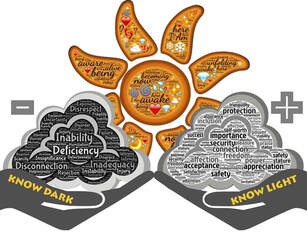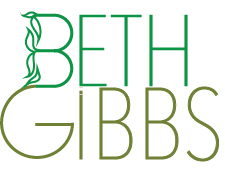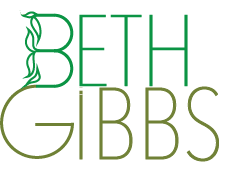ENLIGHTEN UP! a blogSelf-awareness stories: lighting our way to clarity, contentment and resilience in a complicated world.
|
 Is karma a bitch or is it beneficial? Good question. The answer is – it depends. Let’s begin with a joke because to paraphrase Mary Poppins, “A spoonful of laughter makes the medicine go down.” “Have you heard about the new restaurant called Karma? There's no menu: You get served what you deserve.” That’s a funny line but it’s not literally true that if you do good all your life, only good things will happen and if you do bad only bad things will happen. We can look around our country and the world and see terrible things happen to good people who live their lives on the straight and narrow, follow the rules, care for the less fortunate, and keep faith with their religious or spiritual path. Then without warning BAM! disaster strikes and they find themselves caught up in a pandemic, a man-made catastrophe, or a terminal illness. How often have you heard someone say in so many words, “But I’m a good person, how can God let this happen to me?” Others blame karma. How often have you heard someone say, “Karma is a bitch!” The reality is, that stuff happens and sometimes it’s no one’s fault. On the other hand we see people who do great harm, who continue to amass wealth and power and are never held accountable for actions that hurt so many. If bad things happen to good people and good things happen to bad people, how can we explain karma? To understand what karma is and how we can work with it to navigate the ups and downs of life, we start with the true meaning of the word. The literal translation of karma, a Sanskrit word, is ‘action.’ It refers to both the actions we take and how we address the consequences of those actions. Here’s how Barbara O’Brien of the buddhism.about.com blog explains it: The word “karma” means “action,” not “fate.” In Buddhism, karma is an energy created by willful action, through thoughts, words and deeds. We are all creating karma every minute, and the karma we create affects us every minute. It’s common to think of “my karma” as something you did in your last life that seals your fate in this life, but this is not Buddhist understanding. Karma is an action, not a result. The future is not set in stone. You can change the course of your life right now by changing your volitional (intentional) acts and self-destructive patterns. So, is karma a bitch or beneficial? The answer depends on our actions. In other words, how we react or respond to events and situations and the consequences that follow those actions. Reactions happen when there is an event or situation that sets off our internal alarm bells and we have a reaction that may be aggressive, impulsive, out-of-control or shortsighted. Reactions can lead to consequences that are, all too often, not in our best interest or aligned with our goals. This pattern of negative behavior may eventually morph into complicated life issues, which can affect us, and our significant others in unhelpful ways. There are no guarantees but stuff happens, so it’s wise to consider our actions and how they may affect present and future outcomes. Responses follow an event or situation that sets off our internal alarm bells but we have learned to pause, breathe and think before addressing the event or situation. Responding often produces a calmer, value-centered, and productive solution. Self-awareness enables us to hit pause in the space between what is happening and how we might respond. All too often, the pause is not seen or sensed and what happens is a blind reaction instead of a considered response. You can read a helpful article on the difference between reactions and responses here: https://communityforwardsf.org/blog/mindfulness-monday-reacting-vs-responding Usually we have no problems responding to positive events and situations. Responding calmly and productively when the ‘shit hits the fan,’ as it inevitably will, takes more work. Consider the year of the pandemic - #2020. Many of us, myself included, reacted with fear and concern about Covid 19. Being stuck at home with yoga classes and gyms where I taught cancelled or closed, I reacted by eating more sweets, binge watching TV and gnashing my teeth at needing to Zoom for human connection. Those reactions led to increased stress, frequent visits from ‘The Blues’ and extra pounds around my middle. I knew I needed an attitude adjustment to shift my unhelpful reactions to more positive responses. One morning, I opened my email and saw a list of lifestyle ‘medicines’ that could make the difficult times we were (and still are) living through bearable. They are:
That was the nudge I needed and it was right on time! At first I picked three items from the list, routine, movement, and breath. Then I added laughter. The extra pounds came off, my mood improved and my resiliency re-surfaced. I was responding instead of reacting. Nobody’s perfect and it’s impossible to always respond in positive ways to stressful events. If you find yourself reacting with anger and fear most of the time, you’re actually conditioning the mind to see karma as a bitch. However, by responding to events and situations, even difficult ones, with a measure of clarity, and resilience, you are conditioning your mind to respond and view karma in ways that are beneficial to yourself and others. One way to condition your mind to respond more positively is to practice self-awareness, (https://www.bethgibbs.com/fivelayersofselfawareness.html). Another is to engage the energy of intention, (https://www.bethgibbs.com/enlightenup/archives/01-2020). These are two key techniques to understanding and working with karma as action, not fate.
1 Comment
|
Archives
July 2024
AuthorBETH GIBBS started her yoga practice in 1968, four months after her son was born and she’s been practicing ever since. She currently teaches all levels therapeutic yoga classes for adults, and specialty classes for seniors in the Hartford, Connecticut area. Beth is a certified yoga therapist through the International Association of Yoga Therapists and is guest faculty at the Kripalu School of Integrative Yoga Therapy. She writes for the blogs, Yoga for Healthy Aging, and Accessible Yoga. Her master’s degree from Lesley University in Cambridge, MA is in Yoga Therapy and Mind/Body Health. Categories |
|
|
Enlighten Up! a Blog
|
Copyright © 2023 Beth Gibbs

 RSS Feed
RSS Feed
